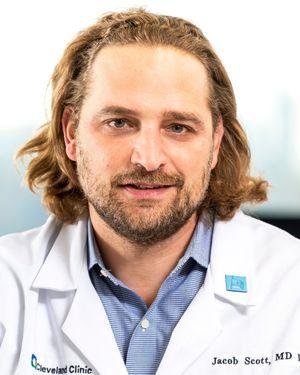Research News
08/22/2023
Cleveland Clinic-led team awarded $2.8 million to translate cancer cell evolution research to clinical care
Work with computer and preclinical models aims to bridge the gap between studying evolutionary biology in the lab and delivering to patient care.

The Scott Lab: Front row (left to right): Jaylen Crump (standing), seated: Kristi Lin-Rahardja, Karoline Martinsen, Paulameena Shultes, Anna Stacy, Olivia Beebe, Karyn Elkanich Second row standing (left to right): Kyle Card, Siamrut Pantanavanich, Bezhou Feng, Jason Grey, Eshan King, Dagim Tadele, Maximillan Strobl Back row (left to right) Arda Durmaz, Mashiro Hitomi, Jacob Scott, Davis Weaver, Rowan Barker-Clarke The National Institutes of Health recently awarded Cleveland Clinic's Jacob Scott, MD, DPhil, and collaborators $2.8 million to translate research on how cancer cells evolve and compete into patient care. The project aims to move previous advances done in vitro closer to clinical reality by developing computer and preclinical models side-by-side, a significant step in the fight against multidrug-resistant cancers that are responsible for more than 90% of cancer deaths.
This is a milestone for research into "evolutionary games" or the interactions between cancer cells within tumors that lead to treatment resistance. Cancer cells evolve to grow and survive in harsh environments caused by medications and surrounding healthy cells, affecting one another in an ecosystem. These interactions are important but have traditionally been studied theoretically or in petri dishes, making translation to the clinic difficult.
Computational models are the "bridge" necessary to study these models in patients, says Dr. Scott, a radiation oncologist and head of Translational Hematology & Oncology Research's Theory Division. Treating cancer is a months-long process, so time is a challenge in collecting the data necessary for clinical application.
"As we pursue targeted therapies using drugs that inhibit specific cancer processes, we need to explore how to predict cell evolution," Dr. Scott says. "We have promising mathematical models and results in a dish, but we need to develop the processes necessary to study these systems in animal models to allow application to humans."
This five-year project focuses on lung cancer, but the goal is to gradually build models for other cancers – even per patient, Dr. Scott says.
Dr. Scott is co-principal investigator with Andriy Marusyk, PhD, a long-time collaborator at Moffit Cancer Center. Another collaborator is Emily Dolson, PhD, former post-doctoral fellow in Dr. Scott's lab and now an assistant professor at Michigan State University.
This grant builds on years of research in Dr. Scott's lab, which developed an assay for measuring the interactions between healthy and cancerous cells that lead to treatment resistance. Last year, the team (including Dr. Marusyk) published results in Science Advances using the assay.
That study serves as an example of how studying these interactions can provide clues for cancer care. Cells evolved differently depending on the concentration and timing of the administration of the drug gefitinib. The findings demonstrate how this research holds promise for shaping treatment, as alternative schedules (including less medication) have shown promise in reducing tumor size and delaying the onset of drug resistance.
"Developing new models is critical for advancing this field to where we can use it to shape treatment type, length and amount," Dr. Scott says. "This project could lead to seeing these evolutionary principles that have been around since the times of Charles Darwin aid innovative cancer care."
Featured Experts
News Category
Related News
Research areas
Want To Support Ground-Breaking Research at Cleveland Clinic?
Discover how you can help Cleveland Clinic save lives and continue to lead the transformation of healthcare.
Give to Cleveland Clinic